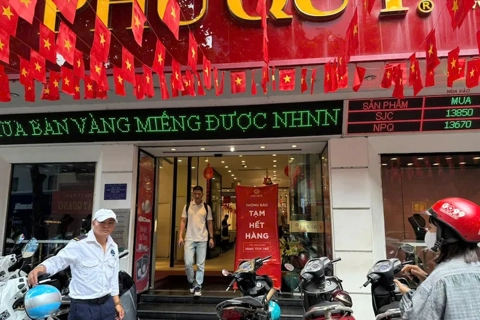FLC-linked stocks subject to forced delisting from HoSE
Under current regulations, stocks subject to delisting but still meet requirements as a public firm would be required to list on the Unlisted Public Company Market (UPCoM).
Over 567 million shares from the FLC Faros Construction Company (ticker: ROS) are set to be delisted from the Ho Chi Minh Stock Exchange (HoSE) from September 5.
| Shares of FLC Faros are set to be delisted from HoSE from September 5. |
The HoSE announced the move in a statement released on August 25, one day after having sent a warning to FLC over the possibility of a forced delisting.
The HoSE’s authority also noted it has received an explanation letter from FLC Faros over its obligation for information disclosure but concluded that the company is not able to release its financial statement for the first half of 2022 on time.
In addition, FLC Faros has not submitted other documents, including the financial statement for the first and second quarters, audited financial statement, and annual report for 2021.
The HoSE expressed concern about the fact that the company has not held the annual meeting of shareholders, and has not had a minimum number of members of the Board of Directors, or a legal representative.
The HoSE suggested FLC Faros may further violate the regulation on information disclosure, and thus, cause negative impacts on the lawful rights of investors.
Under current regulations, if issuers of to-be-delisted shares still qualify as a public company, they would be required to list on the Unlisted Public Companies Market (UPCoM), which currently has a price range of +/- 15 % instead of 7% as in the HOSE.
Companies with forced delisting shares can only return to the HoSE after at least two years of operating on the UPCoM.
ROS share’s price stood at VND2,510 (US$0.11) apiece before being suspended for transaction on August 12.
Board Chairman of FLC Faros Nguyen Binh Phuong last week sent a letter to HoSE regarding the company’s roadmap to realize its commitments as a public firm.
The letter, however, did not mention specific dates for the disclosure of required documents and said it would do so once an auditor is selected, having appointed a new legal representative and organized an irregular shareholder meeting.
The FLC Group is also at risk of its stock (ticker: FLC) being delisted following HoSE’s decision to suspend transaction on August 18, due to the corporation's failure in addressing violations of information disclosure regulations.
FLC has reshuffled its management board after the arrest of its CEO Trinh Van Quyet and other high-ranking executives for alleged stock market manipulation and hiding information.
The corporation’s business performance, however, remains on the downside with an after-tax loss of VND640 billion (US$27.3 million) in the second quarter, taking the accumulated loss in the first half of the year to VND1.1 trillion ($47 million).












